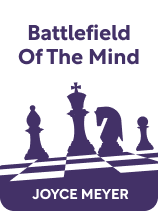

This article is an excerpt from the Shortform book guide to "Battlefield of the Mind" by Joyce Meyer. Shortform has the world's best summaries and analyses of books you should be reading.
Like this article? Sign up for a free trial here .
What’s the book Battlefield of the Mind by Joyce Meyer about? What, exactly, does it mean that the mind is a battlefield?
If we hope to live the positive life that God intends for us, we must first win the battle for our minds. Satan tries to trap us in a negative life by convincing us to focus on negative thoughts. In Battlefield of the Mind, best-selling author, speaker, and Bible teacher Joyce Meyer teaches that Satan tries to trap us in a negative life by filling our minds with negative thoughts, but that we can thwart Satan’s attempts by focusing on God and His teachings.
Keep reading for the background and overview of Battlefield of the Mind.
Background & Overview of Battlefield of the Mind
By aligning our minds with the Holy Spirit and using Jesus as our role model, we can learn to focus on and cultivate the positive thoughts that will lead to a happy, fulfilling, and faithful life. That’s the position taken in the book Battlefield of the Mind by Joyce Meyer. Here’s the book’s background and a quick overview.
About the Author
Joyce Meyer is a well-known Bible teacher and a New York Times best-selling author. She has written 130 books that have sold millions of copies and been translated into 155 languages.
Meyer is the president of Joyce Meyer Ministries. She and her team run various outreach efforts, including Hand of Hope (which provides humanitarian aid worldwide), Project GRL (which focuses on empowering women and girls), and the St. Louis Dream Center (which provides local relief to struggling families in the St. Louis area).
Meyer reaches millions of people worldwide through her daily program Enjoying Everyday Life, which broadcasts through radio, television, and podcasts. She also hosts an annual women’s conference, the Love Life Women’s Conference, that draws participants from around the world. She makes regular public speaking appearances both around the United States and internationally.
Connect with Joyce Meyer:
The Book’s Publication
The book was initially published in 1995 and was re-published by Faith Words in 2011. This guide refers to the 2011 version. In the introduction to this newer version, Meyer explains that she has included new insights, material, and updates to stories and anecdotes included in the initial version.
The Book’s Context
Battlefield of the Mind is part of a long tradition of popular self-help books that emphasize the power of positive thinking. For example:
- In 1902, James Allen wrote As a Man Thinketh, where he proposes that our thoughts shape our reality and that by mastering our thoughts, we can create the life we want.
- In 1952, Normal Vincent Peale wrote The Power of Positive Thinking: A Practical Guide to Mastering the Problems of Everyday Living, in which he proposes that we can overcome any obstacle in our lives with a positive mindset and faith in God.
- In 2008, Rhonda Byrne wrote The Secret, where she argues that a positive mindset shapes a positive life.
- Shawn Achor wrote The Happiness Advantage in 2008, where he highlights the link between happiness and success, arguing that happiness is the root rather than the cause of success.
Many of Meyer’s arguments share principles with the “positive psychology” field. This branch of psychology can be traced back to the 1950s, but it was popularized in the 1990s by Martin Seligman, who was president of the American Psychological Association at the time. Positive psychology seeks to empower people to live happy and fulfilling lives by taking ownership of their thoughts and mental habits and cultivating inner strength.
Battlefield of the Mind also follows a religious tradition known as the Prosperity Gospel movement. This movement is an offshoot of Christianity that teaches that God wants his followers to be healthy, wealthy, and successful. It was popularized by televangelists in the 1970s, and it’s very popular among American Christians today. (A poll taken in 2006 found that 17 percent of Christians in the United States ascribe to the movement.) Meyer is considered to be one of the modern leaders of the Prosperity Gospel movement (along with her popular contemporary Joel Osteen).
The Book’s Impact
Battlefield of the Mind is the best-selling book of roughly 130 publications written by Joyce Meyer (she has a large collection of published books, devotionals, Biblical studies, and other publications). It has sold over three million copies and has been translated into 47 languages.
The Book’s Critical Reception
Battlefield of the Mind, like Joyce Meyer herself, is wildly popular. However, both she and the book have also received criticism. This criticism largely falls into three categories:
- Theological validity: Meyer has been accused of suborning scripture for personal gain. As we will discuss further in our commentary, her interpretation of scripture has been characterized as self-serving and often departs from the Christian tradition.
- Academic validity: Battlefield of the Mind is in large part a self-help book. Throughout the book, Meyer provides advice on issues such as overcoming depression, addressing difficulties with mental focus, overcoming obstacles in a marriage, and so on. However, she does not cite research nor address expert advice in her coverage of these topics. Rather, she relies on personal experience and opinion.
- Personal criticism: Meyer has received criticism for her personal wealth and lavish lifestyle over the years. While she has addressed the issue and argues that there is no conflict between her financial success and her preaching of Christian values, many see an ethical conflict between preaching Christianity and profiting so much.
The Book’s Organization
Meyer divides the book into three parts. Part 1 deals with the importance of keeping a positive mind and introduces her imagery of our mind as a battlefield between Satan’s negativity and God’s positivity. In Part 2, she describes common signs that indicate that our mind is under attack from the devil. These signs, which she calls “conditions,” result from negative thoughts the devil plants in our minds. In Part 3, Meyer describes “wilderness mentalities,” which are negative mindsets in which our minds can become trapped when Satan’s negative influence goes unchecked.
The Book’s Synopsis & Main Points
“Battlefield of the mind” is not a metaphor. In her bestselling book of 130 publications, author, Bible teacher, and speaker Joyce Meyer explains that whether we know it or not, we are engaged in a constant and literal battle for the well-being of our minds. On one side of the battle is Satan, who tries to corrupt our minds and lives with his negativity. On the other side are Christians hoping to live the meaningful and fulfilling life God intends for them.
(Shortform note: While any reader can glean the secular components of Meyer’s arguments, the book is written for a Christian audience.)
Meyer’s goal is to convince readers that the quality of our life hinges on recognizing Satan as the source of our negative thoughts and engaging him in battle. She uses a combination of scripture, anecdotes, and personal witness to explain what Satan’s attacks on our minds look like, their effect on our well-being, and how we can address them. She assures us that we can defeat Satan by cultivating our spirituality and relationship with God.
Here are the book’s main points:
- A positive life requires a positive mind.
- A positive mind is focused on God.
- Satan tries to keep our minds negative.
- Our mind is under attack if it is:
- Unfocused
- Overly rational
- Doubtful
- Anxious
- Judgmental
- Complacent
- Common negative mindsets include:
- Allowing the past and present to determine the future
- Avoiding responsibility
- A self-defeating attitude (being impatient, making excuses, feeling unworthy, being jealous, etc.)
- Cultivating a positive mind involves fighting against the devil (with scripture, praise, and prayer) and thinking like Jesus.

———End of Preview———
Like what you just read? Read the rest of the world's best book summary and analysis of Joyce Meyer's "Battlefield of the Mind" at Shortform .
Here's what you'll find in our full Battlefield of the Mind summary :
- How the Devil makes it his mission to corrupt our minds with negative thoughts
- How to recognize the signs that Satan is attacking your mind
- How to thwart Satan’s attacks and find happiness and fulfillment





